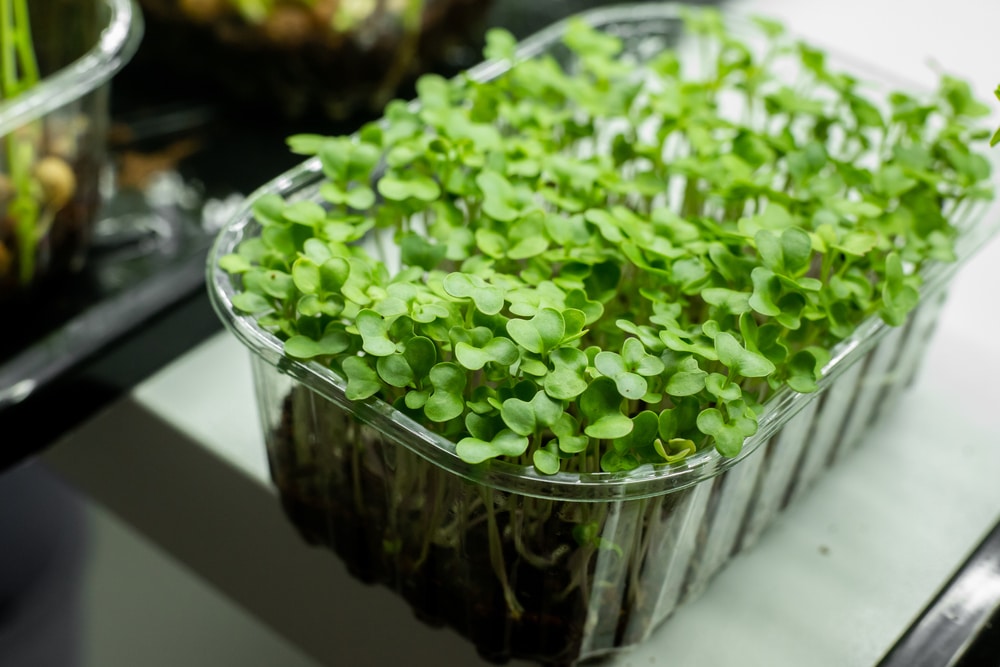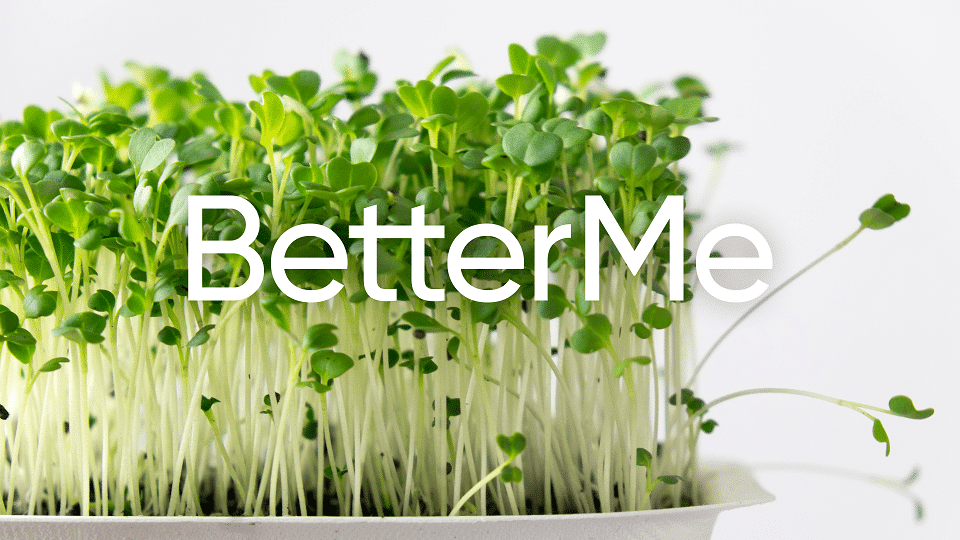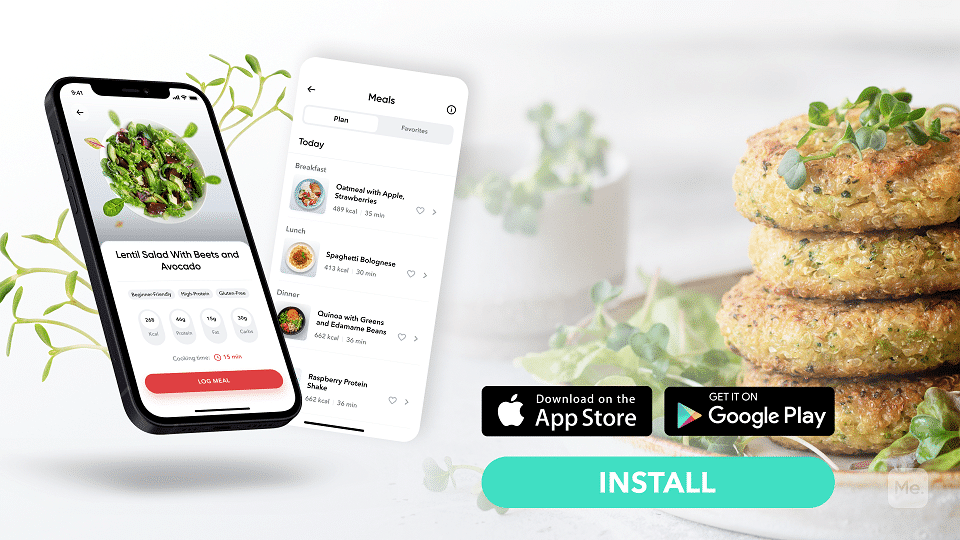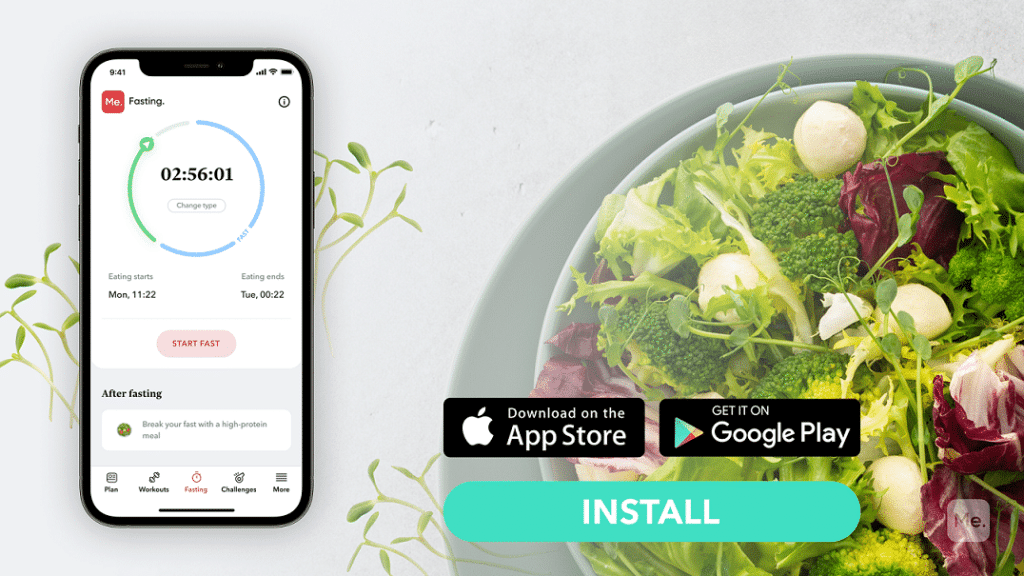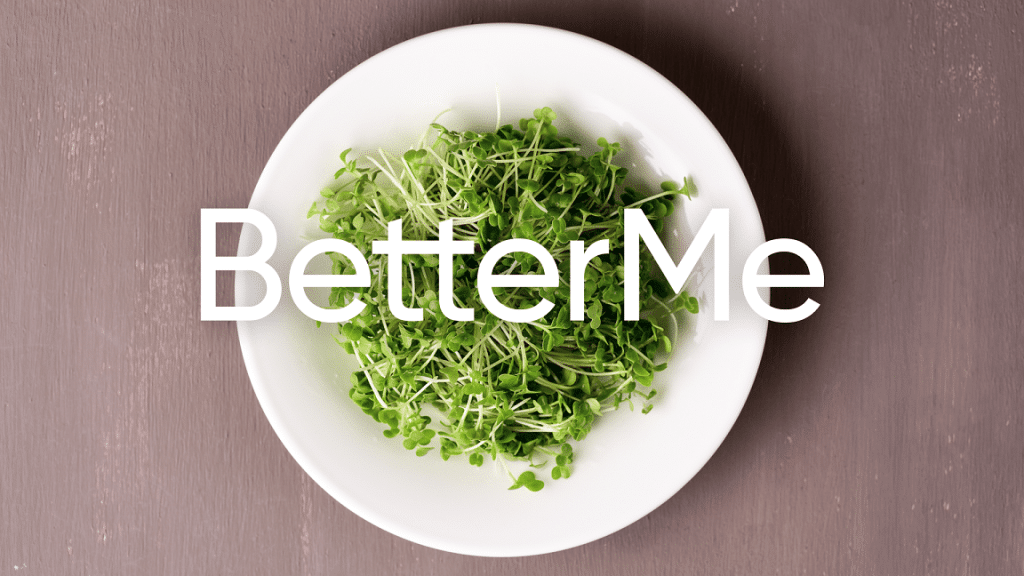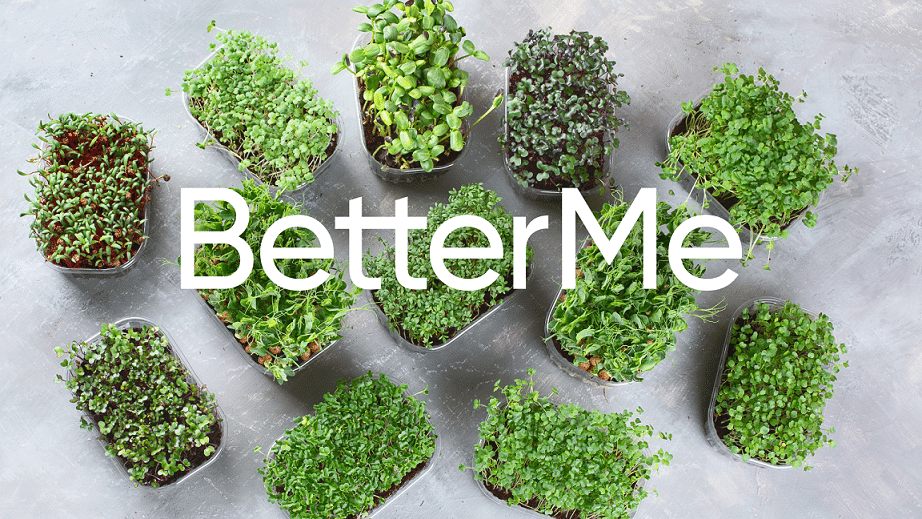Don’t like broccoli? Try broccoli microgreens instead. Imagine getting all the flavor and nutrients of this plant without having to suffer through the texture of the florets. Thanks to a recent surge in popularity, it’s easier to find broccoli microgreens at a store or grow your own batch right in your home. Before you start adding broccoli microgreens to every meal and tossing them into smoothies, let’s discuss what exactly they are and their best uses.
Broccoli Microgreens: What Are They?
Broccoli microgreens are simply very young broccoli florets and stalks. It’s the stage in the plant’s life cycle before it grows into a full-sized vegetable.
Although harvested from the same family, broccoli microgreens do not taste anything like their adult counterparts. While older broccolis have a sharp and bitter taste that’s not at all appealing to some people, broccoli microgreens have a pleasant flavor that’s slightly sweet and nutty.
Don’t confuse these microgreens for sprouts as they are not the same. While sprouts are harvested 2-7 days after planting and don’t have leaves, microgreens are harvested 7-21 after planting and have leaves.
You might think because microgreens are so small, they may not be as good for you as the grown florets. This can’t be further from the truth. These mini plants pack a nutritional punch- in fact studies have shown that minigreens may contain up to 9 times the concentration of nutrients compared to the mature vegetables.
Broccoli Microgreens Nutrition Facts
Broccoli microgreens contain the same nutrients as broccoli florets, only in more concentrated quantities.
While research is still being done to determine the exact quantities of each nutrients in the microgreens, this data from the USDA on the nutrients in broccoli can give us a rough idea of which nutrients we get from the newly sprouted leaves of this plant:
1 cup (91 grams) of raw broccoli contains (3):
- Calories: 31
- Water: 89%
- Protein: 2.5 grams
- Carbs: 6 grams
- Sugar: 1.5 grams
- Fiber: 2.4 grams
- Fat: 0.4 grams
- Vitamin C: 70% of the DV
- Vitamin K1
- Folate
- Potassium
- Manganese
- Iron
This vegetable also contains a number of antioxidants and plant compounds including Sulforaphane, Indole-3-carbinol, Carotenoids, Kaempferol, and Quercetin.
Read More: Sunflower Microgreens: Nutrition Data, Health Benefits, And Side Effects
Health Benefits Of Broccoli Microgreens
Microgreens potential health benefits include:
Cancer Prevention
Cancer is characterized by the uncontrolled growth of abnormal cells, which can be initiated by DNA damage due to oxidative stress. Research has shown that sulforaphane and other compounds in broccoli may protect our cells from the damage caused by oxidative stress (5).
Other nutrients that can help protect us from oxidative stress include beta-carotene, Vitamin C and lutein. Broccoli is also rich in plant chemicals known as indoles which activate enzymes that may help clear carcinogens before they can damage DNA (5).
As mentioned above, these nutrients are found in larger quantities in microgreens than their adult counterparts, making them a great addition to your healthy diet.
Improved Bone Health
Broccoli and other green vegetables high in vitamin K are great for bone health. The vitamin K-dependent protein called osteocalcin is believed to play an important role in bone mineralization.
Other bone-nourishing nutrients in broccoli microgreens include calcium, magnesium, manganese and potassium (5).
Lower Cholesterol Levels
Cholesterol serves many important functions in the body. That said, too much cholesterol in the bloodstream can lead to heart disease. A diet rich in plant-based foods is believed to help lower LDL cholesterol levels, and broccoli microgreens are no exception (5).
They contain substances that bind with cholesterol-containing bile acids in the digestive system, preventing them from being reabsorbed into the bloodstream (5). This is one of the most profound nutrient qualities of broccoli microgreens.
Improved Blood Sugar Balance
Blood sugar increases after consuming food containing carbohydrates. This is normal, but if you have diabetes or insulin resistance, your body has a harder time getting sugar from your blood into your cells. If blood sugar stays elevated over time, damage can occur.
Broccoli microgreens contain significant amounts of chromium which helps insulin do its job so that your cells can use those carbohydrates for energy. Chromium may help reduce fasting blood sugar levels in diabetics (4). The fiber in broccoli microgreens can also help with blood sugar balance because it slows down the rate at which foods are digested, giving your body more time to process them (10).
Weight Loss
Because of their high fiber content, microgreens can be useful for people who are trying to lose weight. Just don’t expect them to magically make you skinny on their own (10). They contain nutrients that support fat loss and keep you satisfied and nourished, but they won’t make you lose weight without a healthy diet and exercise routine.
Reduced Inflammation
Inflammation is the body’s response to injury or illness. When you sprain your ankle, for example, pro-inflammatory substances are produced which cause pain and swelling. While this pro-inflammatory response helps protect us from further harm, it can also be harmful if it persists for too long.
Broccoli microgreens contain bioflavonoids and isothiocyanates- substances that help reduce inflammation by blocking enzymes which produce pro-inflammatory compounds in the body (5).
Improved Eye Health
The antioxidant lutein is known to help protect the retina of the eye, which can deteriorate due to oxidative stress (9). While this substance does not absorb well when taken in supplement form, it is very effective when ingested through food sources such as broccoli microgreens. Other microgreen vegetables high in lutein include kale and basil.
Increased Energy And Endurance
Broccoli microgreens can help fuel our body to run like a well-oiled machine. Some of the most important nutrients for energy production and endurance include iron, B vitamins (B1, B5 and B6), Vitamin E, and Zinc (7). Several studies have shown that deficiency in Zinc might lead to lower physical performance in adults (14).
This deficiency is often seen in vegetarians, making microgreens an excellent source of this important nutrient. Iron plays a role in hemoglobin formation- the substance that carries oxygen to our cells. Lastly, Vitamin B1 (thiamin) and Vitamin B5 (pantothenic acid) support energy production in the body (7).
If you wish to cinch your waist, tone up your bat wings, blast away the muffin top – our fitness app was created to cater to all your needs! BetterMe won’t give excess weight a chance!
Improved Digestion And Gut Health
Many plant-based foods are known to contain significant amounts of fiber.
The average adult needs 20-35 grams of fiber each day, but many people only get half that amount. Broccoli microgreens are an excellent source of prebiotic fibers which support the growth of beneficial gut bacteria and help keep you regular. Fiber is also believed to help lower the risk of heart disease (10).
These nutrients support digestive health and help prevent symptoms associated with irritable bowel syndrome, ulcerative colitis and Crohn’s disease (10).
Natural Detoxification
Detoxification is the body’s natural response to harmful substances or waste products. The colon is one major detoxification center because it is rich in good bacteria that help the body remove toxins and waste.
When broccoli microgreens are included in your diet, your colon stays functional and healthy, which prevents constipation and other common bowel problems.
Improved Immunity
Broccoli microgreens are rich in vitamin C which acts as an antioxidant, strengthens the immune system and helps fight congestion, colds and flu. The high amounts of vitamin C also support the body’s ability to heal and repair tissue (11).
Healthy Hair, Skin And Nails
Biotin deficiency can lead to brittleness in hair and nails, as well as dermatitis. When you eat broccoli microgreens regularly, they contribute to your biotin intake so you can avoid these symptoms (1).
Fights Chronic Disease
Broccoli microgreens fight chronic disease by keeping the body strong and balanced. This is because they contain an abundance of nutrients like Vitamin A, Vitamin C, beta-carotene, folate, calcium potassium and iron (5).
The vitamin A in these greens helps maintain healthy eyesight; Vitamin C supports a strong immune system; calcium and potassium support healthy blood pressure levels; and iron supports energy production (5).
Improvements In The Health Of Pregnant Women
Broccoli microgreens are packed with nutrients that offer significant health benefits to pregnant women. These nutrients include folate which prevents birth defects, calcium for strong bones and teeth, Vitamin A for healthy vision and skin, Vitamin C for immunity and potassium to keep blood pressure levels in check (5).
Read More: Microgreens Benefits, Nutrition, Side Effects, And How To Grow Them
Broccoli Microgreens Side Effects
Broccoli is usually well-tolerated, and allergies to it as well as microgreens are rare. However, there are a few potential side effects worth noting:
Thyroid Problems
Just like broccoli, broccoli microgreens may be high in goitrogen. This is a substance that can interfere with iodine absorption, which is necessary for the thyroid gland to function. This is usually not a problem unless you suffer from hypothyroidism, or your iodine intake is low (6).
Then again- if you have low iodine levels in the first place, microgreens may help correct this. Broccoli sprouts have been used for decades in Japan as a natural way to treat iodine deficiency.
Hemolytic Uremic Syndrome
This is a rare condition where red blood cells are destroyed and rendered useless by bacteria which multiply in the gut after we eat contaminated foods (8). There is no evidence that microgreens specifically can cause this condition, but they do sometimes come in contact with contaminated soil so it is still advised to cook them before eating.
Interaction With Blood Thinners
Since broccoli and other leafy green vegetables contain vitamin K, which can counteract the effects of blood thinning medication such as warfarin (13). Typically, the most important thing is to keep your vitamin K intake consistent, but talk to your doctor and dietitian if you are on blood thinners.
How To Grow Broccoli Microgreens At Home
It’s easy to grow your own broccoli microgreens at home. There are several ways of doing this, including using the following items:
- Seedling Tray or some other shallow container with drainage holes
- Organic potting soil that is sterile and free of chemical fertilizers
- Spray bottle for misting the leaves
- organic broccoli seeds
Begin by thoroughly washing your hands. Sterilize your seedling tray by placing it inside a large bowl, then pour boiling water over it.
Let the tray cool down before you use it, making sure that no water remains inside. Fill it with potting soil up to 1/2 inch from the top edge. Then moisten the soil thoroughly without soaking it or creating puddles of standing water. For best results, place your tray in an area where it will get full sunlight.
Sprinkle the seeds evenly across the surface of your potting soil. Then mist them with a spray bottle until thoroughly dampened. Finally, cover the tray with plastic wrap while keeping it moist but not wet for 3-5 days or until microgreens sprout.
To harvest your broccoli microgreens, carefully remove the plastic cover and cut just above the soil line. Your broccoli microgreens are now ready to eat or store for future use!
BetterMe is your fast-track ticket to a long-lasting weight loss! Tailor your fitness journey and maximize your results with just a couple of swipes!
How To Use Broccoli Microgreens
Their unique flavor is something that some people love while others don’t enjoy it at all. If you are trying to incorporate them into your diet, there are several ways in which you can do so.
Juicing
One of the best ways to get microgreens nutrition is by juicing. Just be sure to mix them with fruits and vegetables that are less bitter than broccoli, otherwise your juice might taste strange. This vegetable juice is extremely nutritious and contains nearly all the vitamins and minerals found in full-sized broccoli.
Salads
Raw broccoli microgreens can be used as a salad topping. Tossing some into your existing salads will add additional nutrients such as Iron, Thiamin (B1), Riboflavin (B2), Niacin, Folate, Vitamin C and Manganese.
Soups
Add some broccoli microgreens to your vegetable soup for an extra burst of flavor. You can also use them as a garnish on top of cream-based soups just before serving.
Sandwiches
Their tangy flavor can add a nice twist to your sandwiches and burgers. You might even want to just use them as lettuce in place of full-sized leaves.
Steam Or Saute
If you don’t like the taste, we recommend steaming or sauteing these microgreens. You’ll still get their antioxidant and nutrient benefits without having to force them down.
The Bottom Line
Broccoli microgreens are the tiny version of full-sized broccoli. They may provide a lot of health benefits and can be used as a healthy addition to smoothies, salads, sandwiches, and soups. They’re also super easy to grow at home.
DISCLAIMER:
This article is intended for general informational purposes only and does not serve to address individual circumstances. It is not a substitute for professional advice or help and should not be relied on for making any kind of decision-making. Any action taken as a direct or indirect result of the information in this article is entirely at your own risk and is your sole responsibility.
BetterMe, its content staff, and its medical advisors accept no responsibility for inaccuracies, errors, misstatements, inconsistencies, or omissions and specifically disclaim any liability, loss or risk, personal, professional or otherwise, which may be incurred as a consequence, directly or indirectly, of the use and/or application of any content.
You should always seek the advice of your physician or other qualified health provider with any questions you may have regarding a medical condition or your specific situation. Never disregard professional medical advice or delay seeking it because of BetterMe content. If you suspect or think you may have a medical emergency, call your doctor.
SOURCES:
- Biotin Deficiency (2021, nih.gov)
- Botanicals and Their Bioactive Phytochemicals for Women’s Health (2016, nih.gov)
- Broccoli, raw (2019, usda.gov)
- Chromium Information (n.d., mountsinai.org)
- Crucial facts about health benefits of popular cruciferous vegetables (2012, sciencedirect.com)
- Effect of broccoli sprouts on thyroid function, haematological, biochemical, and immunological parameters in rats with thyroid imbalance (2018, pubmed.gov)
- Fueling for Performance (2018, nih.gov)
- Hemolytic uremic syndrome: new developments in pathogenesis and treatment (2011, pubmed.gov)
- The Effect of Lutein on Eye and Extra-Eye Health (2018, nih.gov)
- The Health Benefits of Dietary Fibre (2020, nih.gov)
- Vitamin C (2021, nih.gov)
- Vitamin K2 Plays Key Role in Bone Health (2019, americanbonehealth.org)
- Warfarin and Vitamin K (2020, uofmhealth.org)
- Zinc at the crossroads of exercise and proteostasis (2020, nih.gov)
